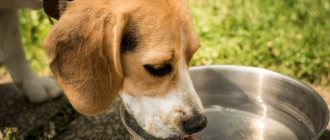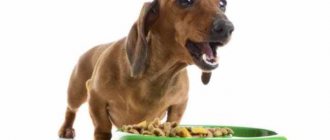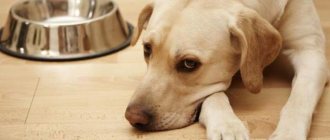The Yorkshire Terrier, a miniature dog weighing about 3 kilograms, is the most popular four-legged pet, living as a full member of the family in many homes. Every responsible owner worries about keeping playful, touching dogs. Visits to veterinarians, reading literature, communicating on online forums - and it seems that everything is known about the animal. But it still happens that the dog becomes lethargic, apathetic, and turns away from his usual, previously loved food. The owners are sounding the alarm. What to do if your Yorkie doesn't eat well? How to solve this problem?
Answer
A pet is not just a creature ready to carry out commands at the first call. The dog shows feelings and thoughts, is capable of being sad and sick. You should not treat your pet like furniture in the house. When feeding, you do not need to leave food out all day. If your beloved pet is not eating well, do not try to hand feed the dog (it may help), continue to place the food bowl in the same sequence.
If the pet is initially spoiled or fed incorrectly, the solution is expected to be difficult: you will need to break the pet. The food is left for 15-20 minutes, then watch the dog. If you haven't eaten, put the food away. If the animal has eaten a smaller amount, add a smaller portion when feeding again. Do not forget about the ban on feeding food from the master's table. If the food is constantly standing, the dog develops an instinct to eat at any time: during the day, in the morning, at night. The opposite happens: the dog wants to try the owner’s food and begs. We recommend that you take this seriously.
Clinical classification
By time of occurrence:
- prenatal;
- postnatal.
By etiology:
- nutritional;
- infectious;
- associated with defects in regimen and diet;
- associated with prenatal damaging factors;
- caused by hereditary pathology and congenital developmental anomalies.
By severity:
- PEM degree I – body weight deficiency 11–20%;
- PEM II degree – body weight deficiency 21–30%;
- PEM III degree – body weight deficiency › 30%.
By periods:
- elementary;
- progression;
- stabilization;
- convalescence.
By form:
- acute – manifested mainly by loss of body weight and its deficiency in relation to normal body weight by height;
- chronic - manifested not only by a lack of body weight, but also by significant growth retardation.
Some special variants of the BEN variety:
- kwashiorkor (a form of acute protein deficiency), nutritional marasmus, marasmic kwashiorkor;
- malnutrition in older children;
- lack of microelements (copper, zinc, selenium).
Main reasons
There are a number of possible reasons for a dog’s refusal to eat, let’s take a closer look. The first option involves stress. Some animals become so attached to their owners that even with a short separation they can become very sad. Animals are emotional. There are 2 main types of stress: short-term (going to the doctor, getting a haircut) and long-term (death of the owner, long separation). If your pet constantly asks to be held, stress is probably to blame.
Remember, selected bitches completely lose their appetite during heat. It is worth considering the option that your pet is too spoiled and has certain taste habits. An option is possible: the owner is already hand-feeding the pet, then the pet is finally able to refuse food.
Check to see if a family friend is sick. Perhaps a cold has developed. The easiest way to determine is to measure the temperature. This also includes difficulty with the gastrointestinal tract, in the presence of abdominal pain. Parasites and infectious diseases should not be ruled out; check with your veterinarian for sure.
If you are sure that this is not a disease or infection, try increasing physical activity: walking more, running, jumping, trying to tire the dog out (using stress distraction), may help. As for bloating (swelling), the problem is probably in the diet. Try to remove it yourself by undergoing a course of treatment for mild intestinal cleansing (Duphalac or an analogue). If it helps, reconsider the animal's diet. If it was not possible to reduce the bloating within 24 hours, it is not recommended to neglect or postpone a visit to the veterinarian. The worst case scenario is that the dog ate bad food.
Sometimes fasting is considered normal, for example, during pregnancy, changes occur at the hormonal level, offer the bitch more vitamins A, B1, E. Vitamins containing calcium should be added to the usual diet. If the menu mainly consists of crackers, try to switch to natural food, it is healthier for the bitch and offspring.
In any position, the pet must have access to fresh water without restriction. The dog can become exhausted; during pregnancy, this does not happen for long. During illness, the dog realizes that it is not worth eating. There may be an excess of nutrients needed by the body.
Yorkies refuse to eat dog food
Many owners will think that their Yorkies are picky or finicky, but there may be other reasons for this besides fickleness. Some puppies and dogs will gradually develop a dislike for dry food or another type of commercial food, while for others it can happen overnight without explanation.
Once a favorite food, now less than tempting... and whether it develops slowly or seems to happen suddenly, it can be frustrating and worrying for owners.
After all, you carefully chose the brand for optimal health, and if you refuse food, another option must be implemented almost immediately.
© shutterstock
When your Yorkie refuses to eat his dog food or chews on it a little but doesn't seem interested in it, there are a few things the owner should pay attention to...
Have you just changed your brand?
Very common among owners who have just had new puppies, although a conscientious owner can change brands of dog food at any time if they learn that the current brand of food does not provide the necessary nutrients or contains negative elements such as fillers, artificial colors or high levels of preservatives. But here's the thing...owners switch to offering a healthy option, but the Yorkies refuse to eat it, defeating the purpose of changing the meal plan.
What you need to know is that the Yorkshire Terrier breed can be very sensitive to changes in diet. If a brand—or even flavors within the same brand—changes too quickly, it can cause stomach upset. Even if your Yorkie isn't vomiting or developing diarrhea, the refusal to eat may have nothing to do with taste and everything to do with a stomach and digestive system that can't handle the rapid changes.
Regardless of your Yorkie's age, it is best to take 3 to 4 weeks to change food. You'll want to mix the current type with the new one, allowing for gradual customization (be sure to mix them together very well):
- Week 1: 3/4 old, 1/4 new
- Week 2: 1/2 and 1/2
- Week 3: 3/4 new, 1/4 old
- Week 4: Your Yorkie can now only be fed the new variety.
A Yorkie technically eats, but he chews and collects rather than eats the food?
Some dogs actually have selective eating patterns. It is not uncommon for Yorkies to scrutinize their food, especially after changing brands, although this can be a habit that develops even with a favorite product. This is more common with dry kibble products, which contain many different ingredients and flavors. For example, dogs may carefully select pieces of chicken flavor and leave behind beef or vegetable flavors.
If you know you've chosen a high-quality, nutritious brand and are gradually transitioning to it, you can mix in a small amount of low-sodium chicken broth or beef broth, depending on what your puppy or dog prefers.
Is there a categorical refusal to eat dog food?
Considering the advice above regarding quick changes, methods to avoid selective eating, without red flags of a health problem, it may simply be a matter of preference.
As puppies become teenagers and teenagers become adults, the perception of taste can change.
Science already knows that human taste buds change over time, and there is no reason to believe that the same cannot happen to dogs.
Re-evaluating what you feed your Yorkie and considering not only the taste but also the preferred texture of the food can make the necessary changes.
© shutterstock
In terms of texture, keep in mind that teething puppies have sore gums and a combination of loose teeth and teething, which may lead to rejection of the hard crust as it simply causes too much discomfort. Older dogs, especially those who have had tooth loss, may need to be switched to a softer diet.
Was York exposed to table scraps?
Before answering this question, consult with all family members. While you may have strict rules about it, your child or your husband may succumb to those puppy dog eyes when you're not around. Or maybe you even give in sometimes. The thing to keep in mind here is that dogs do have taste buds, they like different textures... and when allowed to eat human food, almost any dog will crave it instead of their dog food. Humans have 9,000 taste buds, dogs have 1,706; however, even with such a rich palate, they can enjoy all types of flavors, including sour, salty and sweet. The dog will also like fat.
Additionally, since dogs have an exponentially better sense of smell than humans, and smell plays a huge role in interpreting food, this will cause Yorkies, if given a choice, to desire human food much more than dog food.
All new owners are advised to never offer table scraps. This may cause your Yorkie to refuse to eat dog food. This can also be a starting point for begging.
If your Yorkie has been eating human food and is refusing his own food to the point where he is losing weight, you may want to switch to home cooking that includes these positive, healthy ingredients and eliminates any overly fatty, salty, or otherwise unhealthy ingredients .
When loss of appetite is normal
In hot weather, neither people nor animals want to eat. If your pet refuses to eat on a hot July day, but hides in the shade and sleeps a lot, the behavior is most likely due to the hot weather. As soon as it gets a little cooler, your dog will reach for the bowl.
Often the appetite decreases in bitches during the period of estrus. This is also considered normal. But if your pet does not want to eat even after the rut, you need to consult a doctor; perhaps your pet has uterine diseases, which can only be determined by a specialist.
Some animals react with a decrease in appetite to the introduction of mineral supplements and vitamins into the diet. Eliminate all additives for a while to test this version.
Puppies of mixed breeds are often subject to changes in their eating moods. In general, during the teething period, almost all puppies experience problems with appetite. At this time, it is better to replace dry food with wet food.
Symptoms
Symptoms of protein-energy malnutrition are varied and worsen depending on the stage of the disease. For ease of understanding, they should be considered in accordance with each degree of severity:
- BEN I degree. Among the main symptoms are the following: slight pallor of the skin, moderate motor restlessness, thinning of subcutaneous fat, possible manifestations of symptoms of rickets and deficiency anemia;
- BEN II degree. Sleep and appetite disturbances, periodic vomiting, fluctuations in body temperature during the day, visually noticeable exhaustion in the trunk and limbs, pale or gray skin, dry and flaky skin, decreased muscle tone, brittle and dull hair, decreased food tolerance, unstable stools (constipation gives way to diarrhea and vice versa). In children, there is a lag in psychomotor development: the child does not sit, does not stand on his feet, refuses to walk and does not hold his head well;
- PEN III degree. General lethargy, lack of interest in the environment and active movements, disturbances in thermoregulation (a person quickly cools down), sunken cheeks, weak, muffled heartbeat, shallow breathing, in some cases apnea is manifested, stool, food tolerance and all types of metabolism are impaired, the abdomen is enlarged (due to flatulence). Rickets, anemia, and dysbiosis often appear.











